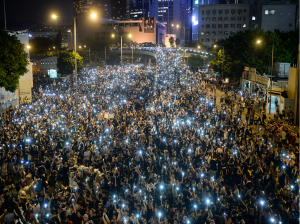A different kind of civil disobedience
On Friday, October 31, the Asian Law Students of Osgoode in conjunction with the Dean’s office welcomed Mr. Jason Ng, an adjunct lecturer at the University of Hong Kong’s Faculty of Law and head of Debt Capital Markets Legal at PNB Paribas Hong Kong, to speak on Hong Kong’s pro-democracy movement known as “Occupy Central” or the “Umbrella Revolution.” This movement, which is spearheaded by high school and university students, began in Hong Kong’s financial district on September 28 of this year and is the biggest pro-democracy movement as well as the most significant social and political event in Hong Kong’s history since its reversion from British to Chinese rule in 1997.

headquarters on Sept. 29, 2014. Photo credit: Slate.com
Mr. Ng has been reporting from and volunteering at the protest sites on a daily basis since the beginning of the movement. He shared his experience and insights in front of an intimate audience consisting of Osgoode students, faculty members, as well as social sciences majors from York University. Here is a brief overview of the Umbrella Revolution, and why this movement is different from many other acts of civil disobedience.
What is the Umbrella Revolution?
When Hong Kong reverted back to Chinese rule in 1997, the Chinese government promised the thriving metropolis a political system known as “One Country, Two Systems.” Essentially, this is a complex legal framework that allows Hong Kong to retain its capitalist economic and political structures as well as a high degree of autonomy over its political, legal, civil, and economic affairs. A mini-constitution, known as the “Basic Law,” was drafted to govern the city of 7.2 million upon its return to China and to enshrine the Chinese government’s commitment to preserving Hong Kong’s democratic system. Under the Basic Law, certain freedoms such as the freedom of speech, assembly, religion, and free press, which the residents of Hong Kong previously enjoyed under British rule, are also guaranteed until 2047.
On August 31 of this year, however, the National People’s Congress Standing Committee (“NPCSC”), a de facto legislative body consisting of approximately 150 members of China’s national legislature, a.k.a. the National People’s Congress, announced a proposal concerning Hong Kong’s Chief Executive election in 2017 which in effect undermines the system of democracy that was promised.
Article 45 of the Basic Law states that Hong Kong’s Chief Executive should ultimately be selected “by universal suffrage upon nomination by a broadly representative nominating committee in accordance with democratic procedures.” NPCSC’s August 31 decision, however, reveals that much emphasis is placed by the Chinese government on the words “by a broadly representative nominating committee.” Essentially, NPCSC ruled that candidates running in the Chief Executive election would require more than fifty per cent of the nominating committee’s votes in order to appear on the ballot. This guarantees that only candidates approved by Beijing would be able to run for Hong Kong’s Chief Executive election in 2017.
This decision was met with strong resistance from pro-democracy activists, students, and concerned citizens. On September 28, tens of thousands of protesters took to Hong Kong’s streets to demand the continuation of the “One Country, Two System” regime and to call for an election system that reflects authentic democracy.
What sets the Umbrella Revolution apart from many other acts of civil disobedience?
The Umbrella Revolution is different from many other acts of civil disobedience in that it has remained relatively peaceful and non-violent even in the face of police violence, provocation, and government neglect.
On the first day of the protest, for example, police in Hong Kong reported using tear gas eighty-seven times on unarmed protestors. While this led to public outcry, citizens responded by flooding to the streets and joining the protest in a peaceful manner to demonstrate solidarity with the protestors. Umbrellas became the symbol of resistance in this pro-democracy movement as they were used to resist tear gas and pepper sprays from the police. In a photograph Mr. Ng shared with the audience during his speech, protestors are shown to hold up umbrellas to shield police officers from a downpour, which epitomizes the spirit behind “Occupy Central with Love and Peace.”
What comes next?
While many media sources have reported the movement to be in the process of winding down, Mr. Ng notes that it is, in fact, still going strong. It appears that the Umbrella Revolution has grown into something much bigger than a pro-democracy movement. It has also elevated the sociopolitical consciousness and solidarity of many of Hong Kong’s residents as well as opened up important dialogues on Hong Kong’s future.
As one participant of Mr. Ng’s talk aptly notes, it is important that some conversations be had even if they may not lead to a different outcome.
For updates on the movement, please check out Mr. Ng’s blog: www.asiseeithk.com.
In closing, Mr. Ng encourages those who are interested in both business law and social justice to stay engaged and proactive. He notes that many law students are conditioned to think that business law and social justice are two streams which are mutually exclusive. The reality is, one can do both. All that is required is to take the first step in forging that path.
